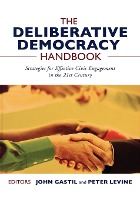Praise for The Deliberative Democracy Handbook
"The Deliberative Democracy Handbook is a terrific resource for democratic practitioners and theorists alike. It combines rich case material from many cities and types of institutional settings with careful reflection on core principles. It generates hope for a renewed democracy, tempered with critical scholarship and political realism. Most important, this handbook opens a spacious window on the innovativeness of citizens in the U.S. (and around the world) and shows how the varied practices of deliberative democracy are part of a larger civic renewal movement."
--Carmen Sirianni, professor of sociology and public policy, Brandeis University, and coauthor, Civic Innovation in America
"The Deliberative Democracy Handbook, edited by John Gastil and Peter Levine, is an important collection of readings for anyone interested in the role of citizen participation in the public policy process. It provides concrete examples of successful efforts to expand public input in decision-making at the local, state, and national levels. The book also grapples with emerging challenges to the continued development of these efforts in the future."
--Robert Mark Silverman, associate professor, Department of Urban and Regional Planning, University at Buffalo, the State University of New York
"In government, we need to get beyond the polarization of interest groups if we are to make good and politically sustainable decisions. The Deliberative Democracy Handbook shares lessons of endeavors around the world to engage the community in the complex task of decision-making. I recommend it to anyone in public office."
--Hon. Alannah MacTiernan, minister for planning and infrastructure, Western Australia
"Clear-eyed about the challenges as well as the promise of public deliberation, the book will be an invaluable resource for practitioners and scholars alike."
--Francesca Polletta, associate professor of sociology, Columbia University

